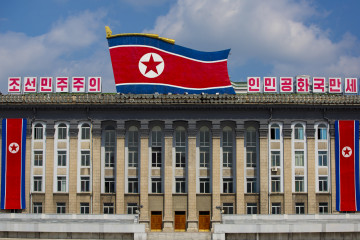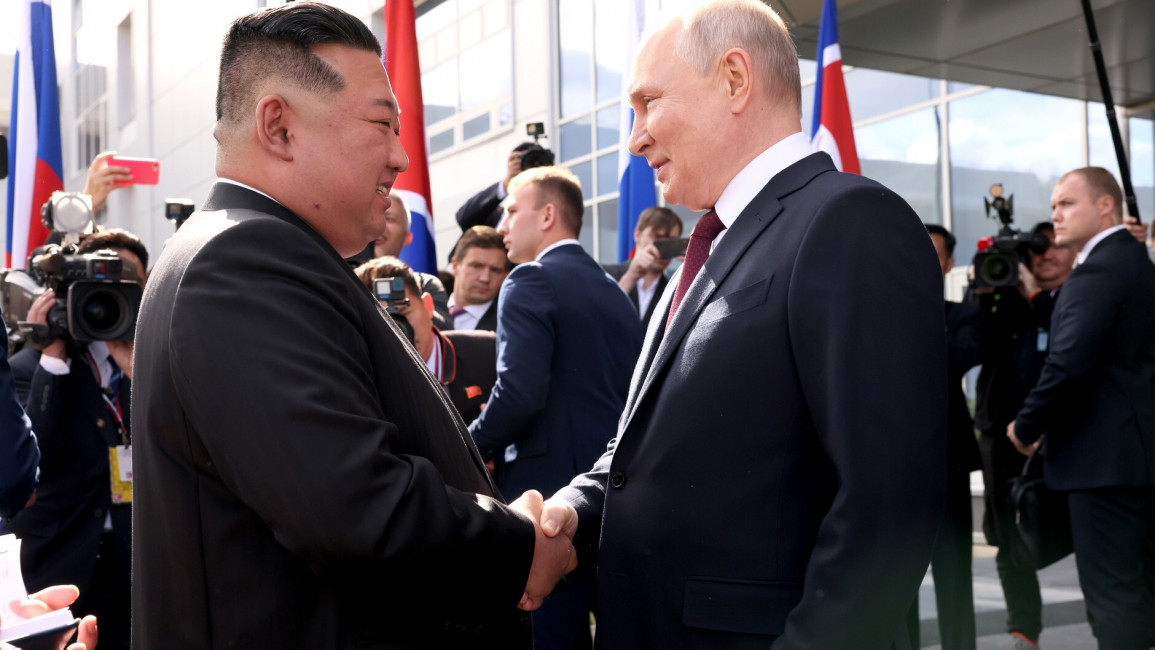

On 12 September, North Korea’s Supreme Leader Kim Jong-Un met with Russian President Vladimir Putin at the Vostochny Cosmodrome in the Russian Far East.
Kim’s visit to Russia, which was his first foreign trip since the Covid-19 pandemic began in 2020, fuelled intense speculation that North Korea would supply ammunition, rockets, and artillery shells to aid Russia’s invasion of Ukraine.
Although Russia borders North Korea, there are logistical complications associated with large-scale arms deliveries. The narrowness of the Russia-North Korea border, which spans just 17.3 km terrestrially and 22.1 km as a maritime boundary, poses the greatest challenge to arms exports.
To overcome this obstacle and evade detection, North Korea could attempt to export arms to Russia via third countries. In November 2022, The White House warned that North Korea was trying to use intermediaries in the Middle East and Africa to facilitate weapons sales to Russia.
"Kim's visit to Russia fuelled intense speculation that North Korea would supply ammunition, rockets, and artillery shells to aid Russia's invasion of Ukraine"
Despite decades of Western and United Nations (UN) sanctions, North Korea maintains a considerable network of security partners in the Middle East and Africa. North Korea’s main partners are Syria and Iran, but it has also established links with military strongmen in Sub-Saharan Africa.
These networks could help North Korea transfer arms to Russia, and it remains to be seen how effective US secondary sanctions and South Korean diplomacy will be in addressing this challenge.
North Korea's security partnership with Syria
Since North Korean fighter pilots aided the Syrian Air Force during its 1967 and 1973 wars with Israel, Pyongyang and Damascus have maintained close military ties.
During the 1970s and 1980s, North Korea helped the Syrian Arab Army upgrade its T-54 and T-55 tanks, supplied Syria with man-portable air defence systems (MANPADS) and aided President Hafez al-Assad’s brutal 1982 crackdown on Muslim Brotherhood protests in Hama.
North Korea has also aided Syria’s ballistic missile development and pursuit of weapons of mass destruction. Israel’s September 2007 strike on Syria’s al-Kibar nuclear reactor near Deir az-Zour, which was modelled after North Korea’s Yongbyon nuclear reactor, allegedly resulted in the deaths of ten North Korean nuclear scientists.
Under Kim Jong-Un’s leadership, North Korea has resolutely supported President Bashar al-Assad in the Syrian civil war. North Korean military advisors reportedly aided the Syrian Arab Army’s May 2013 offensive in al-Qusayr, which resulted in a decisive victory for Assad’s forces, and the Chalma-1 and Chalma-7 North Korean battalions surfaced on the frontlines in 2016.
A February 2018 UN report labelled Syria and Myanmar as the two main destinations for North Korean missiles. North Korea’s delivery of acid-resistant tiles fuelled speculation of renewed support for Syria’s chemical weapons program.
Although the intensity of hostilities in Syria has dissipated, North Korea’s partnership with Damascus remains robust. Building on a June 2019 bilateral economic agreement, Syria has courted North Korean workers to facilitate its reconstruction.
|
|
The UN Panel of Experts estimates that Syria welcomed at least 800 North Korean military personnel and labourers during the second half of 2019. To capitalise on any future border reopening, Syria appointed Qusay Thabet Mustafa as its ambassador to Pyongyang in November 2022.
The enduring strength of North Korea’s partnership with Syria presents opportunities for Russia. Rim Yong Hyok, a North Korean national with close ties to Korea Mining Development and Trading Corporation (KOMID) activities in Syria, has been sanctioned by the US for facilitating arms transfers to the Wagner Group.
Syrian arms trafficker Hussein al-Ali has a long history of funnelling North Korean arms to third parties in Yemen and Libya, and his sanctions-busting experience could aid weapons transfers to Russia.
"North Korea's main partners in the Middle East are Syria and Iran, but it has also established links with military strongmen in Sub-Saharan Africa"
The Iran-North Korea security partnership
Although North Korea established diplomatic relations with Iran under Shah Mohammed Reza Pahlavi’s leadership in 1973, the Pyongyang-Tehran security partnership only gained momentum after the 1979 Iranian Revolution. North Korea began supplying artillery shells to Iran in March 1980 and throughout the 1980-88 Iran-Iraq War, it facilitated clandestine arms shipments from the Soviet Union and China to Iran.
During the 1990s, North Korea began supplying ballistic missile-related equipment, such as Scud transporter-erector-launchers and Nodong missile engines, to Iran. These arms transfers, which foreshadowed an official military-technical agreement in September 2012, coincided with technology transfers between North Korea and Iran.
The Iranian Navy’s Ghadir-class submarines were modelled after North Korean prototypes, while Iranian technicians helped North Korea prepare for its 2009 and 2012 Unha rocket launches.
Due to their shared experience with Western sanctions, Iran-North Korea relations have strengthened since the US withdrew from the Joint Comprehensive Plan of Action nuclear agreement in May 2018.
On 7 August 2018, the day that the US reimposed nuclear-related sanctions on Iran, North Korean Foreign Minister Ri Yong Ho visited Tehran to discuss “bilateral relations and regional issues in the Middle East.” In February 2023, Chairman of the Iranian Armed Forces Chiefs of Staff Mohammed Bagheri called for an expansion of security ties with North Korea.
Iranian media outlets viewed Kim Jong-Un’s visit to Russia as a show of defiance against “US aggression” and hailed North Korea’s potential to humiliate President Joe Biden by consigning the West to a humiliating defeat to Ukraine.
Iran’s encouragement of North Korean assistance to Russia’s war in Ukraine could extend beyond rhetoric. Two employees in the Economic and Commercial Section of the North Korean Embassy in Tehran, Pak Sin Hyok and Ri Kuk Myong, have extensive experience with gold and cash smuggling via Dubai, which Russia also uses as a sanctions-busting hub.
North Korea’s long-standing ties with Hezbollah, a key Russian military partner in Syria, could also facilitate arms transfers.
|
|
North Korea's partnerships in sub-Saharan Africa
Due to its rhetorical support for decolonisation and condemnations of apartheid in South Africa, North Korean arms and instructors proliferated across Africa during the Cold War.
North Korea’s support for the Marxist-Leninist People’s Movement for the Liberation of Angola (MPLA) during the 1975-2002 Angolan Civil War and counter-insurgency assistance to the communist FRELIMO movement during the 1977-92 Mozambican Civil War were especially noteworthy.
While North Korea did not engage in large-scale military interventions in the post-Cold War period, it maintained $100 million in annual trade links with Africa in 2017.
"Since North Korean fighter pilots aided the Syrian Air Force during its 1967 and 1973 wars with Israel, Pyongyang and Damascus have maintained close military ties"
While the intensification of UN sanctions against North Korea has restricted its security partnerships in Africa since 2017, its weapons still have appeal on the continent. Since instigating a war with the Sudan Armed Forces (SAF) in April 2023, Rapid Support Forces (RSF) paramilitaries have been spotted with North Korean BM-11 Multiple Rocket Launchers.
RSF forces captured these BM-11s from the SAF’s existing stockpiles, which were likely accumulated before the 2018 suspension of Sudan-North Korea security links.
In March 2023, Burkina Faso restored diplomatic relations with North Korea. Burkina Faso junta leader Ibrahim Traore subsequently expressed interest in North Korean weaponry, as the Burkinabe military relies on arms that it purchased from Pyongyang in 1985.
As Burkina Faso was North Korea’s largest commercial partner in Africa in 2017 with $32.4 million in annual trade and has strengthened relations with Russia under Traore’s leadership, it is the most likely African third-party facilitator of North Korean arms to Russia.
The future of North Korea's security partnerships
In recent weeks, the US has warned repeatedly that it will impose sanctions on individuals and entities that facilitate North Korean arms transfers to Russia. These sanctions will also apply to third-party conduits in the Middle East and Africa. Beyond Syria, Iran, and Burkina Faso, the US will also pressure US partners, such as the United Arab Emirates and Egypt, to refrain from sanctions evasion activity.
North Korea has used Dubai as a launchpad for cyber-espionage and Egypt has faced intense criticisms for attempting to purchase North Korean arms as a non-permanent UN Security Council member in 2016-17.
South Korea will likely aid the US in reining in sanctions violations and its diplomatic outreaches to traditional North Korean partners in Africa, such as Uganda, have played a critical role in restricting Pyongyang’s arms export networks.
It remains to be seen whether the innovative tactics of Russian and North Korean sanctions busters in the Middle East and Africa will be able to transcend the combined pushback of Washington and Seoul.
Samuel Ramani is a tutor of politics and international relations at the University of Oxford, where he received a doctorate in 2021. His research focuses on Russian foreign policy towards the Middle East
Follow him on Twitter: @SamRamani2





 Follow the Middle East's top stories in English at The New Arab on Google News
Follow the Middle East's top stories in English at The New Arab on Google News


